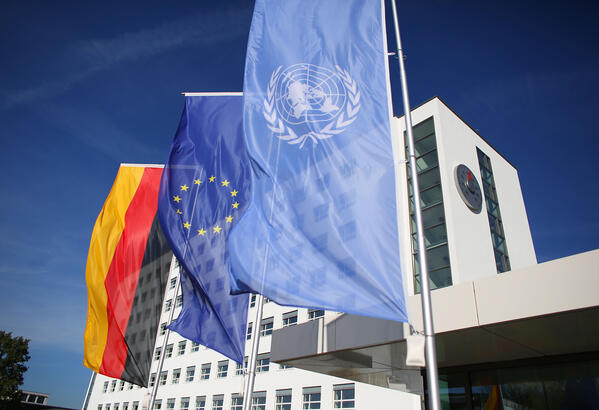Innovative Force behind Climate Cooperation

The climate crisis requires global cooperation because no state or region can overcome this challenge on its own. For decades Germany has been campaigning for climate action, including at an international level.
What role does Germany play at the world climate conferences?
The COP world climate conferences held under the United Nations United Nations The United Nations (UN) has a key role to play in the international system. Germany has been a UN member since 1973. Since joining, Germany has taken on more and more responsibility and is now one of the largest donors and supporters of the United Nations. For example, Germany is the second largest… Read more › Framework Convention on Climate Change (UNFCCC) are a key lever in international climate policy. Germany was a driving force behind the 1992 Earth Summit in Rio de Janeiro and the 1997 Kyoto Protocol. The 2015 Paris Agreement, which saw all states committing themselves for the first time by law to drawing up and implementing Nationally Determined Contributions (NDCs), was a major breakthrough. The international community has also set itself the goal of keeping the rise in global temperatures to well below 2°C and to below 1.5°C if possible.
Active support of the IPCC
Germany wants to achieve the targets set out in the agreement by pursuing an active climate policy. Within the framework of the Petersberg Climate Dialogue, for example, the Federal Government Federal Government The Federal Government and cabinet is made up of the Federal Chancellor and the Federal Ministers. While the Chancellor holds the power to issue directives, the ministers have departmental powers, meaning that they independently run their respective ministries in the framework of those directives… Read more › brings together high-ranking state representatives from all over the world in Germany each year to pave the way for successful negotiations at the world climate conferences. It also actively supports the work of the Intergovernmental Panel on Climate Change (IPCC), whose reports summarise and evaluate the current state of global climate research, laying an important foundation for science-based climate policy.
How does Germany support developing countries with climate action?
Germany acknowledges its responsibility to help developing countries implement climate protection and adaptation measures. Industrial nations have pledged to mobilise 100 billion US dollars each year towards this end. The target was increased at the COP 29 world climate conference in Baku in 2024, and is set to rise to 300 billion US dollars by 2035. In 2023, Germany contributed around 5.7 billion euros from its budget. Germany is also a driving force behind climate partnerships with other countries. For example, it is working with states through the NDC partnership, which was set up in 2016, to help them achieve their national climate protection goals.
Germany also used its G7 Presidency in 2022 to campaign for international cooperation on climate action. At its instigation, the G7 nations agreed to set up a Climate Club which will effectively be open to all countries. In addition the G7 committed themselves to pushing forward Just Energy Transition Partnerships (JETP). These partnerships with pivotal countries for climate policy in the Global South provide a powerful lever to help implement the Paris Agreement. Such partnerships have been established with the following countries:
- South Africa (since 2021)
- Indonesia (since 2022)
- Vietnam (since 2022)
- Senegal (since 2023)


